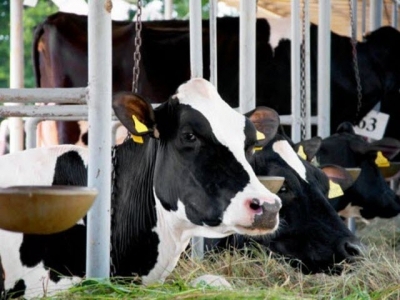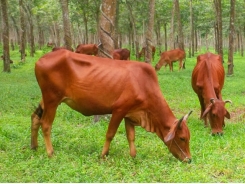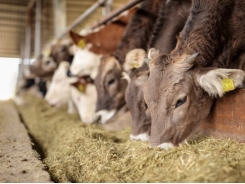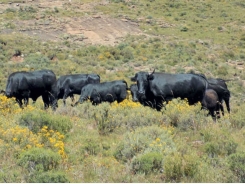Heat-stressed dairy cows may see some benefits from yeast supplements

Supplementing heat-stressed dairy cows with yeast cultures may improve feed efficiency and reduce body temperatures, say researchers.
A team of researchers from several academic and research institutes in Brazil examined the use of yeast culture in the feed of dairy cows experience heat stress. The group published its work in the Journal of Dairy Science.
“We evaluated the effect of dead yeast culture on feed efficiency, nutrient digestibility, plasma metabolites, body heat dissipation, and chewing and ingestion behavior of dairy cows subjected to a hot environment during Brazilian summer,” the researchers said. “We hypothesized that yeast culture would have positive effects on nutrient utilization and heat dissipation capable of inducing improvement in lactation performance and feed efficiency of dairy cows.”
The team of researchers found that adding the yeast culture tended to reduce dry matter intake and digestible organic matter intake, however, it also improved the ratios of milk to dry matter intake (DMI) and energy-corrected milk to dry matter intake.
“Improved thermal comfort and increased feed efficiency were observed in response to feeding dead yeast culture to lactating dairy cows in late lactation during the Brazilian hot season,” the researchers said. “Yeast culture supplementation increased plasma niacin and glucose concentrations, reduced rectal and skin temperatures and respiration rate, and increased feed efficiency by reducing DMI at similar milk yield.”
1/ Why yeast culture?
Although some of the results from adding yeast cultures to feed have varied, the overall trend is for positive outcomes, said the researchers. Some of the influences found have included providing growth factors for ruminal microorganisms, improving nutrient digestibility, reducing lactic acid levels in ruminal fluid, and increasing amounts of niacin in plasma along with potentially boosting immune function.
Selecting cows to improve milk yields has tended to make them more sensitive to heat stress, they said. Increased yields also raise digestible nutrient intake and metabolic heat generation.
Heat stress may cause financial loss by depressing milk yield, lowering reproductive efficiency and reducing the longevity of cows, they said. Heat stress has been linked to lowered feed intake, immune deficiency, increased maintenance energy needs and dependence on glucose, and give cows a propensity to develop acidosis.
There has been a theory that yeast supplementation could have a positive influence on dairy cows subjected to heat stress, as stressed-cows appear to have a more positive milk production response to yeast-based products, they said. “Positive effects of yeast-based products on feed efficiency of dairy cows under heat stress have been observed, either driven by increased milk yield at similar intake or reduced intake at similar yield,” they added.
“However, when dairy cows were subjected to a short-term thermal challenge in climatic chambers, the supplementation of live yeast and enzymes reduced the rectal temperature, but did not attenuate the negative effect of the excessive heat load on lactation performance and intake,” said the researchers.
2/ Methods and materials
In the feeding trial, 32 cows faced high temperatures and humid conditions for a period of 35 days, said the researchers. Two diets were used in the study – a control total mixed ration with corn silage (CTL) and that diet supplemented with a commercial dead yeast culture (YC).
Feed intake was noted daily and feed and ort samples were collected for analysis, they said. Milk production was recorded daily and samples were collected twice weekly every week of the feeding trial.
Milk energy secretion and body weight gain were calculated and body conditions scores were recorded, they said. Rectal and skin temperatures and respiration were recorded on days 4 and 7 of each week and sweating rate was noted.
The total tract apparent digestibility of dry matter, organic matter (OM), neutral detergent fiber (NDF), non-NDF OM and starch also were established, they said. At the end of the study, feed sorting behavior was measured and blood and ruminal fluid samples also were collected.
3/ Results
Supplementing feed with the yeast culture reduced dry matter intake and digestible OM intake (DOMI), but did not change milk yield, the researchers said. Milk, energy-corrected milk and fat-corrected milk to DMI ratios all increased for the supplemented cows.
No differences were found for body weight, body weight gain, somatic cell count or diet digestibility, they said. However, plasma niacin concertation did increase for the cows on the supplemented diet and rectal and skin temperatures along with respiration rates were reduced.
“The YC reduced the proportion of cows with rectal temperature ≥39.2°C, defined as the threshold to suggest the occurrence of heat stress,” they said. However, the rate of sweating tended to increase and there was a suggestion that the efficiency of ruminal microbial synthesis might have been improved, they added.
Cow activity was not altered by the diet, they said. But, cows getting the YC diet were less selective against long feed particles in the morning and more selective in the afternoon.
Source: Journal of Dairy Science
Authors: J Dias, R Silva, T Fernandes, E Barbosa, L Graças, R Araujo, R Pereira, M Pereira
Related news
Tools

Phối trộn thức ăn chăn nuôi

Pha dung dịch thủy canh

Định mức cho tôm ăn

Phối trộn phân bón NPK

Xác định tỷ lệ tôm sống

Chuyển đổi đơn vị phân bón

Xác định công suất sục khí

Chuyển đổi đơn vị tôm

Tính diện tích nhà kính

Tính thể tích ao




 Dairy research seeks to improve protein, nitrogen efficiency
Dairy research seeks to improve protein, nitrogen efficiency  How to raise Boer Goat kids
How to raise Boer Goat kids